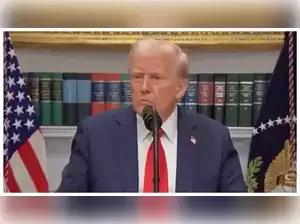US President Donald Trump, known for his staunch support of tariffs as a tool for economic policy, has inadvertently contradicted his own justification for imposing hefty levies on imported automobiles.
In a leaked conversation with leading auto industry executives, Trump reportedly cautioned them against raising vehicle prices in response to his new tariffs, implicitly acknowledging the financial strain such measures could impose on manufacturers and consumers alike.
His remarks contradict his long-standing assertion that tariffs would stimulate domestic production without negatively impacting prices.
Instead, industry experts argue that the 25 percent tariff on imported vehicles and parts would inevitably drive up costs, potentially making automobiles thousands of dollars more expensive for American buyers.
Trump has repeatedly claimed that his trade policies will revive the U.S. manufacturing sector.
However, his latest move appears to undermine this stance, as automakers reliant on imported components would see their production costs rise.
While he assured executives that eliminating former President Joe Biden’s electric vehicle (EV) incentives would offset these challenges, critics argue that dismantling such policies will only stifle industry growth.
Industry analysts, including the Princeton Repeat Project, estimate that dismantling these programs could result in the loss of approximately 100,000 jobs in the auto sector.
Experts contend that Trump’s tariff policy runs counter to the broader shift in global automotive trends. While nations like China are aggressively expanding their EV production capabilities, the U.S. risks falling behind.
Princeton professor Jesse Jenkins noted that EVs represent the future of employment in the industry.
“We either win it—or lose it to China,” Jenkins said, as mentioned in a report by New Republic.
While he has positioned himself as a champion of American manufacturing, his trade restrictions and opposition to green technology investments appear to contradict that goal.
Nobel laureate Paul Krugman and economic historian Adam Tooze have pointed out that Trump’s vision of a revitalized industrial America is based on outdated assumptions about labor and production.
JD Vance, one of Trump’s key allies, has previously argued for combining industrial resurgence with technological advancement.
However, Trump’s tariff-heavy approach and his resistance to renewable energy solutions suggest a reluctance to embrace the very innovations that could bolster American manufacturing.
In a leaked conversation with leading auto industry executives, Trump reportedly cautioned them against raising vehicle prices in response to his new tariffs, implicitly acknowledging the financial strain such measures could impose on manufacturers and consumers alike.
Tariffs and the Price Hike Dilemma
The conversation, first reported by The Wall Street Journal, revealed that Trump warned automakers against passing the burden of tariffs onto consumers.His remarks contradict his long-standing assertion that tariffs would stimulate domestic production without negatively impacting prices.
Instead, industry experts argue that the 25 percent tariff on imported vehicles and parts would inevitably drive up costs, potentially making automobiles thousands of dollars more expensive for American buyers.
Trump has repeatedly claimed that his trade policies will revive the U.S. manufacturing sector.
However, his latest move appears to undermine this stance, as automakers reliant on imported components would see their production costs rise.
While he assured executives that eliminating former President Joe Biden’s electric vehicle (EV) incentives would offset these challenges, critics argue that dismantling such policies will only stifle industry growth.
The Impact on American Manufacturing Jobs
One of the most contentious aspects of Trump’s economic approach has been his opposition to Biden’s push for EV production. His administration has actively sought to repeal emissions regulations and roll back incentives under the Inflation Reduction Act, which had facilitated the construction of battery and EV plants across the country.Industry analysts, including the Princeton Repeat Project, estimate that dismantling these programs could result in the loss of approximately 100,000 jobs in the auto sector.
Experts contend that Trump’s tariff policy runs counter to the broader shift in global automotive trends. While nations like China are aggressively expanding their EV production capabilities, the U.S. risks falling behind.
Princeton professor Jesse Jenkins noted that EVs represent the future of employment in the industry.
“We either win it—or lose it to China,” Jenkins said, as mentioned in a report by New Republic.
A Vision That Doesn’t Add Up
Trump’s approach to industrial revival has drawn criticism from economists who argue that his policies lack coherence.While he has positioned himself as a champion of American manufacturing, his trade restrictions and opposition to green technology investments appear to contradict that goal.
Nobel laureate Paul Krugman and economic historian Adam Tooze have pointed out that Trump’s vision of a revitalized industrial America is based on outdated assumptions about labor and production.
JD Vance, one of Trump’s key allies, has previously argued for combining industrial resurgence with technological advancement.
However, Trump’s tariff-heavy approach and his resistance to renewable energy solutions suggest a reluctance to embrace the very innovations that could bolster American manufacturing.
FAQs
What is the new tariff policy introduced by Donald Trump?
Trump has imposed a 25% tariff on imported automobiles and auto parts, aiming to encourage domestic production. However, this move is expected to increase costs for manufacturers and consumers.How will the tariffs affect car prices in the U.S.?
Experts predict that the 25% tariff will lead to higher production costs, resulting in significantly increased car prices for American consumers, potentially by thousands of dollars.Disclaimer Statement: This content is authored by a 3rd party. The views expressed here are that of the respective authors/ entities and do not represent the views of Economic Times (ET). ET does not guarantee, vouch for or endorse any of its contents nor is responsible for them in any manner whatsoever. Please take all steps necessary to ascertain that any information and content provided is correct, updated, and verified. ET hereby disclaims any and all warranties, express or implied, relating to the report and any content therein.








